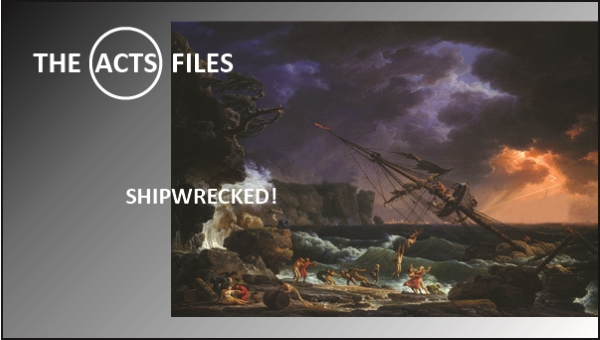By Tyson Thorne

In the fall Festus sent Paul to Rome. Luke sets the tone of the journey at the start, telling us that the winds were not favorable for travel and the ship had to sail under the lee of Cyrus, meaning the captain used the island to take the brunt of the wind by sailing on the north and eastern side of the island. The weather was a constant battle making it slow going.
They continued to use islands to help navigate to various ports, but due to constant delays they found themselves in the wrong season for travel. Luke states the Feast was over, referring to the Day of Atonement which is usually around the end of September or beginning of October. This change of seasons made the Mediterranean unpredictable and dangerous. Paul’s Roman guard, Julius, found a captain desperate enough to try and make the run for the port his ship was docked at would not support the size of the vessel through the winter.
Having received word from God’s spirit Paul warned Julius and the captain that the journey would result in the loss of the ship, its cargo and crew. But the crew and the centurion were more convinced by the experienced captain and set sail. The perilous journey met with disastrous results.
They encountered a terrible storm at sea. Luke describes the tactics used to weather the storm reealing the captain to be a capable seaman. They took down the sails and allowed the ship to be driven by the sea, they attempted to shelter themselves from the brunt of the northern winds with islands which resulted in a measure of control but stressed the hull immensely. To guard against the boat tearing itself apart they used ropes to provide tension on the beams to keep them from separating. They threw the anchors out to provide a deep ballast that would help keep the ship from being tossed about like a cork and to catch on shallow shores slowing the boats progress and to keep it from running aground. Still the storm raged, day after day. As the boat began to take on water and become heavy the crew began tossing the cargo overboard in an attempt to gain buoyancy. All these efforts were for naught, however, and soon it became clear to all that soon the ship would be lost.
While it may not have been the best time, Paul had an “I told you so moment” and proceeded to tell the men how to save their physical lives. He related to them how an “angel” of the Lord, which in the context is clearly a post resurrection appearance of Jesus, told him that the lives of everyone aboard would be spared if they followed his direction.
After two weeks under perilous circumstances, Paul ha them all eat a meal of bread until each had their fill. They then tossed the remaining wheat provisions overboard to lighten the ship and awaited daylight. Some tried to escape in life boats, a plan Paul thwarted warning Julius that all were to obey God’s plan or none would be saved, so the boats were cut free.
The sailors kept an eye on the waters and took multiple soundings and found they were near land. At sunrise they spotted the island and tried to safely make the bay, but it was not to be. The ship ran aground off shore and was being beaten by the fierce waves. The stern buckled and broke apart. Those who could swim jumped overboard and made for the beach, while the others held fast to broken bits of the ships wreckage and paddles to shore. Of the 276 lives aboard, none were lost.
In life there are times that doing the wrong thing seems to be the right choice. In our day it’s called situational ethics. Only by continuing to follow God’s word will one truly be saved.
|
|
|
